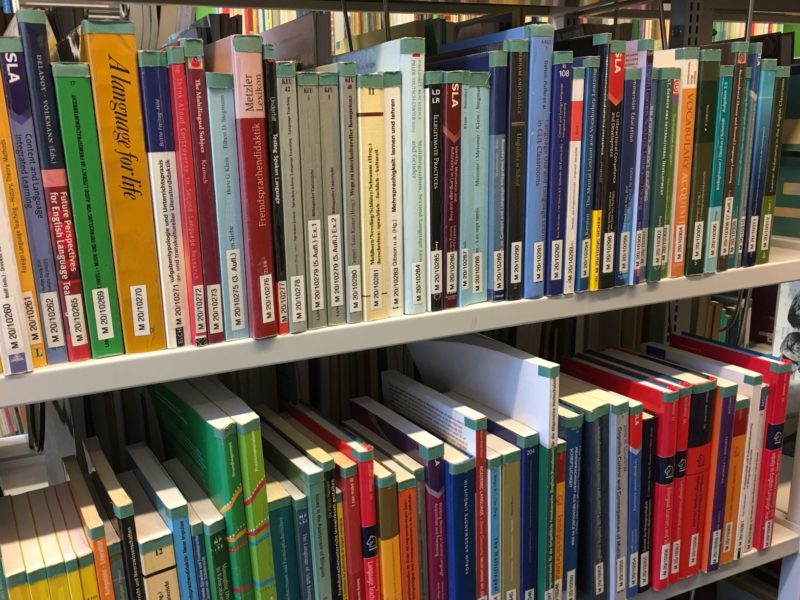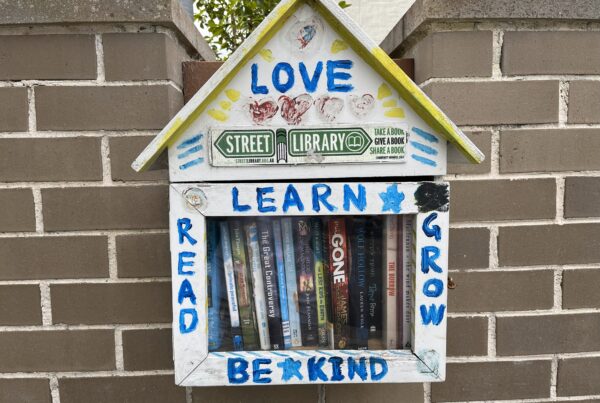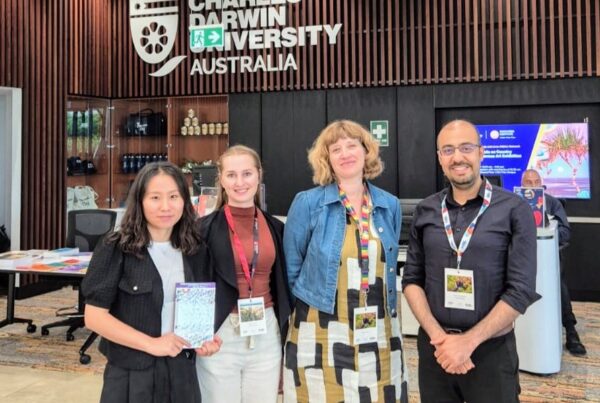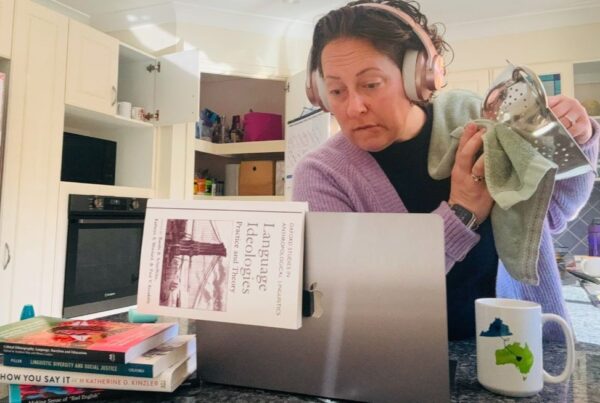
Shelves in the Martha-Muchow-Library of Education at Hamburg University
After a busy 2018 and a relaxing break, Language on the Move is back for another year of sociolinguistics of intercultural communication, language learning, and multilingualism in contexts of migration and globalization. After the success of last year’s Language on the Move Reading Challenge 2018, we’ll start the excitement with yet another reading challenge.
As was the case last year, the Language on the Move Reading Challenge 2019 is designed to encourage broad reading in the discipline and to make linguistics reading fun. It is aimed at anyone with an interest in the relationship between linguistic diversity and social life.
Here is how it works: the challenge will run from February to November, and the challenge is to commit yourself to reading one item in each of the categories below. Team members at Macquarie will undertake the reading challenge as part of their weekly meetings. Others can commit publicly by pledging in the comments below or they can keep their participation to themselves.
One piece of feedback we received from last year’s Language on the Move Reading Challenge 2018 was that participants had difficulties selecting a reading in each category, that they spent more time on selecting than reading, or that they were disappointed in their choices. Therefore, this year each category includes one or more suggested readings. You may simply follow the suggestion or choose a different reading within the set category.
February
Anthropological linguist Alexandra “Misty” Jaffe passed away in November 2018. She will be sadly missed and an obituary is available here. Her paper “Poeticizing the economy: The Corsican language in a nexus of pride and profit” was in production with Multilingua at the time of her death, as part of a special issue devoted to “Re-Imagining Language Revitalization in Contemporary Europe” (guest-edited by Sabina Perrino and Andrea Leone-Pizzighella). The publisher, deGruyter Mouton, has made the paper freely available as a tribute to Misty, and I suggest you start this year’s Reading Challenge with this paper, and maybe (re)read some of Misty’s other publications.
Suggestion
Jaffe, A. (2019). Poeticizing the economy: The Corsican language in a nexus of pride and profit. Multilingua, 38 (1), 9-27. doi:10.1515/multi-2018-0005 [open access]
March
A book about language policy in a migration context.
Suggestion
Salomone, R. C. (2010). True American: Language, identity, and the education of immigrant children. Boston, MA: Harvard University Press.

Reading Challenge or not … always a good read 🙂
April
A book about intercultural communication, language learning, and multilingualism in a legal context.
Suggestion
Angermeyer, P. S. (2015). Speak English or What? Codeswitching and Interpreter Use in New York City Courts. New York and Oxford: Oxford University Press.
May
A book about intercultural communication, language learning, and multilingualism in early childhood.
Suggestion
Benz, V. (2017). Bilingual Childcare: Hitches, Hurdles and Hopes. Bristol: Multilingual Matters.
You might wish to complement this with the following paper, which is available open access:
Piller, I., & Gerber, L. (2018). Family language policy between the bilingual advantage and the monolingual mindset. International Journal of Bilingual Education and Bilingualism, 1-14. doi:10.1080/13670050.2018.1503227
June
A longitudinal ethnography about intercultural communication, language learning, and multilingualism in the context of migration and globalization. These are as rare as hens’ teeth and the two suggested titles are the only ones I am aware of. So, let’s read both.
Suggestion
Farr, M. (2006). Rancheros in Chicagoacán: Language and Identity in a Transnational Community. Austin, TX: University of Texas Press.
Zentella, A. C. (1997). Growing up Bilingual: Puerto Rican Children in New York. Oxford: Blackwell.
July
For the Northern Hemisphere summer holidays: a novel where intercultural communication, language learning, and multilingualism are central themes.
Suggestion
Adichie, C. N. (2013). Americanah. London: HarperCollins.
August
UNESCO has declared 2019 the Year of Indigenous Languages. This means a reading about indigenous languages will have to go on your list. My recommendation is based on what was, for me, the highlight of last year’s Reading Challenge.
Suggestion
Adejunmobi, M. (2004). Vernacular Palaver: Imaginations of the Local and Non-native Languages in West Africa. Clevedon: Multilingual Matters.

And don’t forget to add some children’s books to your readings this year!
September
By September, my annual Literacies class for postgraduate students at Macquarie University will be in full swing and so the challenge will be to read a book about literacy and the politics of knowledge.
Suggestion
Ngũgĩ wa Thiong’o (2012). Globalectics: Theory and the Politics of Knowing. New York: Columbia University Press.
October
An autobiography of a multilingual writer. Having started on Ngũgĩ wa Thiong’o in September and keeping the Year of Indigenous Languages in mind, continue the challenge with his two memoirs with their focus on the politics of language in colonial Kenya.
Suggestion
Ngũgĩ wa Thiong’o (2010). Dreams in a time of war: a childhood memoir. New York et al.: Random House.
Ngũgĩ wa Thiong’o (2012). In the house of the interpreter: a memoir. New York et al.: Random House.
November
In November we’ll be hosting the conference of the Australian and New Zealand Associations of von Humboldt Fellows at Macquarie University. The theme is Sharing Knowledge in the Spirit of Humboldt. 2019 is also Humboldt’s 250th anniversary. Therefore, the final reading of the Language on the Move Reading Challenge 2019 will have to be about the extraordinary multilingual polymath Alexander von Humboldt (1769-1859).
Suggestion
Wulf, A. (2015). The invention of nature: Alexander von Humboldt’s new world. New York: Alfred Knopf.
Share your progress
We invite Reading Challenge participants to submit reviews of their readings to Language on the Move, and we’ll consider them for publication. For ideas check out the review posts which were written as part of the Language on the Move Reading Challenge 2018:
- Yining Wang, Being Chinese in Australia
- Pia Tenedero, Virtually multilingual
- Ingrid Piller, In search of myself
- Laura Smith-Khan, In search of a language and an identity
- Gegentuul Baioud, One orientalism or many orientalisms?
- Ingrid Piller, Why are you not citing any African female expert?
- Ingrid Piller, The Devil’s Handwriting
- Ingrid Piller, Globalization between crime and piety
Another way to share your progress is to tweet about it. If you do, mention @lg_on_the_move as we will occasionally be gifting copies of Intercultural Communication and Linguistic Diversity and Social Justice to one of our interactive followers throughout the year.
Research and knowledge need linguistic diversity
Before you get started, enjoy this multilingual video, which the Language-on-the-Move team produced to celebrate Humboldt’s 250th anniversary. For us, Humboldt today means linguistic diversity in research, science and education.
Can you identify all the languages spoken in the video?*
*Other than the obvious English, they are, in this order: Tagalog, Ga, French, Arabic, Mandarin, Persian, Ndebele, Urdu, Cantonese, German






 This work is licensed under a
This work is licensed under a
Hi all, I have requested a loan of the book True American by Salomone for our March reading through the library, however, they don’t have a copy and cannot loan from other library, so the library actually ordered an online version of the book that is now available in the library for anyone who would love to read it. For quick search, please copy and past the following numbers: 99244742304102171 to the multisearch entry field on the library web page.
Happy reading.
Thank you so much, Andrea! The MQ team owes you 🙂
After the presentation of Ingrid Piller today in Göttingen, I will join the reading challenge this year! Is there any possibility to have access to your discussions about the books in Macquarie (like online slides etc.)?
Welcome, and what a good idea! Let’s think about it and see how we can do that!
Wishing all Language on the Move contributors and readers a happy new #ReadingChallenge year!
I would recommend to read a book about the so-called artificial languages, for example “Bridge of Words: Esperanto and the Dream of a Universal Language” by Esther Schor.
Great to have these excellent suggestions for this year’s challenge. I can highly recommend April’s book and have reviewed it here: https://www.degruyter.com/view/j/mult.2017.36.issue-3/multi-2016-0079/multi-2016-0079.xml
Welcome back language on the move with a new exciting reading challenge for 2019. So excited to get started and read from the fascinating readings suggested! Happy reading everyone! 🙂